I have a maintenance problem in my apartment: “변기 물이 새요” (beongi muri saeyo = toilet water-SUBJECT leak-POLITE = the toilet leaks).
So there’s this guy here fixing it – hopefully. I hate how tongue-tied I can get, trying to speak. For example, I know very well what my apartment number is. But when I was at the doorman’s desk reporting my problem just now, I was utterly incapable of saying a simple o-i-sam (five-two-three).
Brain malfunction. The guy was clearly puzzled, as I’d just managed a more or less fluent sentence explaining that my apartment had a leaking toilet, and then I couldn’t tell him what my apartment number was (which is presumably a much simpler bit of Korean). Argh.
The offending device:

![]()
Caveat: Ugly American Cows
 My friend Bob asked me in an email about what it’s like to be an American in Korea right now. I realize that, if you look at U.S.-based news coverage of the events here, you’d think things were suddenly pretty bad. And I will admit that I definitely am careful about what I do and where I go on the weekends – avoiding places where protests occur, like downtown Seoul (I haven’t gone near downtown in almost a month except a quick shopping trip to pick up some presents for my students on rainy Sunday early afternoon).
My friend Bob asked me in an email about what it’s like to be an American in Korea right now. I realize that, if you look at U.S.-based news coverage of the events here, you’d think things were suddenly pretty bad. And I will admit that I definitely am careful about what I do and where I go on the weekends – avoiding places where protests occur, like downtown Seoul (I haven’t gone near downtown in almost a month except a quick shopping trip to pick up some presents for my students on rainy Sunday early afternoon).
But it’s not really that different, for me, as a foreigner, than it was before the recent explosion of protest and anti-Americanism. Which is to say, there are inevitably people who seem hostile to westerners, or at the least, suspicious. With strangers, however, there’s nothing on me or about me that brands me as, specifically, an American (as opposed to some other type of anglophone westerner, such as a Brit, Australian, Canadian, etc.). But the other thing, which I think I’ve noted before, is that I really think this whole anti-American-beef / anti-American-trade-agreement is much more about dissatisfaction with the recent downturn in the global economy – which America is experiencing too – and about frustration with Lee Myung-Bak’s imperious young presidency.
“Compassionate” and reformist conservatives all over the planet are in trouble with their unfaithful publics, these days: Bush, Sarkozy, LMB, and Howard (who was recently thrown out by the Australians). People get worried when the entrenched social safety nets get threatened too much, on the one hand – especially when economies turn South. But also, what all these figures have had in common is an imperial style that wears thin fast in the face of scandal and evidence of mismanagement. Not that I think liberals necessarily do any better. But there just seems to be some unifying characteristics, is all.
So… I don’t think the protests are so much anti-American as they are anti-LMB and anti-Bush and anti-globalization. But Korea relies more on globalization than almost any other country – certainly among the world’s top 20 economies, it’s among the most dependent on external markets. China depends just as heavily on external markets, if not more so, but the immense size of the country and its population means that it’s inevitably more resilient (I think… I theorize) to global shocks and shifts.
Anyway. All of which is to say, I don’t feel, for example, any notable increase in hostility toward me from either strangers or from acquaintances. Those who are hostile to me are hostile for the same reasons they were before, and are in any event a minority.
On the other hand, I would not want to be an American cow in Korea, these days. That would be… scary. Very scary. The mad American cow is like this eerily reviled symbol, now. But what it stands for is as much a cypher of Korean government indifference as for anything specifically American.
Keep in mind that Koreans believe some unusual things – their weird, wired, webophilic culture has embraced all sorts of urban myths as fact, accentuating and exaggerating things that, on objective analysis, seem patently silly. I remember learning last fall, for example, that a plurality of Koreans believe that it is possible for an electric fan to kill a person while they sleep, merely by blowing on them. Here is a blog on the subject of “fan death.”
I don’t think that paranoia about American beef products is quite in the same mythical category as fan death, but I think it provides a context for understanding how unsubstantiated scientific “facts” about some given health risk can be transformed by a very large, tightly-networked culture into a fearsome reality and lead to mass protests. The main thing that is surprising to me is not that so many people have developed such an inordinate fear but rather that the current Korean government has proven so remarkably inept in managing the situation. They seem weirdly incompetent and naive with respect to forces that their recent high-speed technological bootstrapping of their society have unleashed.
I like to point out – as mildly and nonconfrontationally as I can when talking to people – that FAR MORE people have died in the recent protests about mad cow disease in South Korea than have EVER died from variant Creutzfeldt-Jakob disease (the human version of mad cow that is presumeably caused by it), not only in Korea (where no one has died from it), but in the U.S., too (where only 3 people have died from it). In fact, the only country where there has ever been more than a few cases reported of vCJD is the U.K., which is where mad cow first exploded and was identified as a cause, and where subsequent changes in meat processing and cattle raising techniques have basically shut down the avenue for perpetuation of the disease.
![]()
Caveat: Verbcastles
Allegedly, the Korean language has no relative pronouns. So how do they phrasally modify a noun? They do this cool thing whereby they can nominalize a verb (and all its accompanying baggage, subject, object, etc.) and make it the object or subject of another verb. And this can pile up: a nominalized verb phrase functioning as the subject of another verb, which in turn is nominalized and made the subject of another, etc., ad infinitum.
I won’t even dare to try to show an example – I don’t want to embarrass myself by publishing mutilated Korean. But it’s mind-boggling complex and yet syntactically elegant. We can do it in English, within certain limits, but our natural Subject-Verb-Object word order makes it difficult to enchain indefinitely, while Korean’s Subject-Object-Verb order means the structures can nest comfortably. Maybe I can try to conjure some reliable and concrete examples.
Caveat: 좋지도 않지만 나쁘지도 않아
… just doing OK.
In the last month, I’ve reestablished communication with two very long-lost friends who found me because of my facebook presence. It’s pretty cool. So I have been tweaking my facebook profile with the realization that apparently it’s a good place to be “visible” in the internet world. Maybe I should make a myspace profile too?
I’ve also been working on trying to update my “website” – for the first time since last summer. I’m trying to re-learn CSS so I can get beyond the default formatting that I inherited when I built the websites last year, using the pre-made example kits that come with the ASP.NET development platform.
I’m very happy to have bought a new MP3 player. It’s nice to put it into “shuffle” mode and walk home at night through the humid streets, listening to Slick Idiot or Cat Stevens or U2 or Depeche Mode, completely random.
Here is a picture of me wielding an alligator and a stupid face for the benefit of my bemused students.
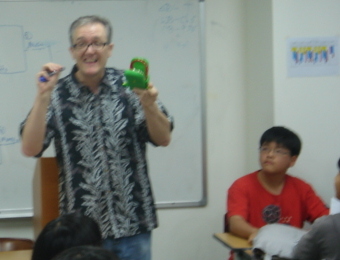
![]()
Caveat: 응!
I’m reaching a kind of landmark with my time in Korea.
Cumulatively, I have now spent more time living in Korea than I did in Mexico. And I wonder at the fact that my Korean is still so bad. Well, not really – there are clearly reasons my Spanish improved so fast when I lived in Mexico, that haven’t applied in this situation. I was much more immersed when I was in Mexico.
That year I spent here in Korea while I was in the Army was the opposite of immersion – my exposure to the language was minimal and my opportunities to study it virtually non-existent. And since I’ve been here this time, my work environment does not provide me with the opportunities I had when in Mexico. Then there’s the issue of the fact that a 20 year old brain is going to perhaps acquire language more efficiently than a 40 year old brain.
Yesterday I was learning the words 법 (beop) and 법률 (beomryul), both of which mean “law” in slightly different ways (one is a derivative of the other, and they relate semantically a little bit like the law/legal pair in English, I think).
But it wasn’t the meanings that threw me, but rather the fact that I still haven’t wrapped my mind around the allophonic (pronunciation) rule that says that in a syllable ending in -/p/ followed by a syllable beginning in /r/-, the -/p/ changes to a -/m/. I understand it phonologically – it follows well-documented, similar patterns found in many languages. It’s just hard to remember to do it. And if I forget to do it, the Korean listening to my speaking ends up hearing gobbledygook.
I did sort of work out a cute little aphorism for describing some essential, stereotypical difference between English and Korean pronunciation. As many know, in English, our “default” sound is a kind of very relaxed schwa sound that leaves the lips relaxed and slightly rounded – that “gaping uh” sound. Further, English has a lot of semivowels (like /r/ or “dark” /l/) that purse the lips out a little bit, as in a /w/ (which purses the lips a lot). Korean, meanwhile, seems to have as its “default” sound a kind of high, tense, unrounded vowel (hangeul 으, romanized as “eu” but /ɯ/ in IPA), and many consonants and vowels are much less rounded than in English, with the sides of the lips drawn back almost tightly. When trying to get Koreans to better pronounce sounds such as /r/ or /w/ in English, I’m constantly saying something like, “push your lips out.” And when they’re trying to help me better pronounce one of those difficult vowels, they’re saying something like, “pull your lips back tight.” Hence my aphorism: Korean is a smiling language, English is a kissing language. Hopefully you can visualize this.
Last summer I visited Arcata (my birthplace and hometown) and went out to Mad River Beach. This is a picture I took of a small stone and a sand dollar I saw lying in the sand in the sun in the surf.

![]()
Caveat: Carbon Amortization
I was reading an article about Priuses in the New York Times (online) that caused me to think, once again, about something I find very troubling about all the discussion of reducing the carbon footprints of the automobiles we drive, about legislating improved mileage and/or offering incentives to buyers of lower-carbon-footprint cars. And it is this: what about the carbon footprint of the manufacturing process? What about other environmental impacts of new cars? Bear with me, while I try to think this through.
Suppose I have a Hummer. It’s a nice, ecologically disastrous beast, with a very high carbon footprint, that I bought in a solipsistic moment some years back. I don’t know enough to actually assign a meaningful number to its day-to-day carbon footprint, but lets say its daily value is “10.” So, one morning, after a long talk with some friends, I wake up feeling guilty, and decide to buy a Prius. So I buy the Prius – and lets say, for the sake of argument, that its daily carbon footprint is “2” – i.e. it puts out 20% of the ongoing emissions as the Hummer.
But what was the carbon footprint of manufacturing the Prius? Is it unreasonable to imagine it might be some rather large number compared to the daily value? I mean, just the delivery from manufacturer to dealer is going to be some largish multiple of the daily footprint, e.g. 20 or 50, right? There’s steel, engine, tire manufacturing. And farther back, there’s high-paid executives and designing engineers at Toyota and their contractors, sitting in air-conditioned offices over years, making the Prius a reality. ALL of that is part of the vehicle’s carbon footprint. Is it unreasonable to imagine that the carbon footprint of the creation of that new Prius might not be, say, in the 1000’s? 10,000’s? What if I go out on a limb, and guess, say, 8000 “units”?
The consequence is as follows: I’m reducing my personal carbon footprint, by switching from Hummer to Prius, by 8 units per day. But the Prius’ manufacture entailed a footprint of 8000. So, that means I will have to own the Prius for 1000 days before I “break even” in terms of carbon footprint. That’s almost 3 years! Wouldn’t it be better for the environment to urge people to KEEP their current cars longer, rather than switch out to lower-footprint vehicles? This would be true regardless of the type of vehicle they currently own.
And I understand very well, I just pulled these numbers out of a hat, and the analysis could be extremely mistaken. But what I wonder about, is why don’t you ever see anyone doing this kind of analysis, in the media? And there are other issues – the Prius has a contingent of non-carbon-related environmental issues, around its high-tech manufacturing processes, and its massive array of batteries – these are not in any way resolved. What about battery disposal? What about the toxics involved in battery and plastics manufacture?
I cannot argue that in terms of real, long-term life-of-product carbon footprint, my father’s 1928 Ford Model A is lower than almost anything else on the road (or, er, in storage, at the moment), because of its under 20 mpg and “dirty” exhaust. But it nevertheless represents maximizing the utility of the manufactured object vis-a-vis its intended purpose. The carbon footprint of the car’s manufacture has amortized for 80 years now! Meanwhile, that self-righteous bastard driving the 2008 Prius, which replaced his 2005 Corolla, which replaced his 2000 VW, which replaced his 1992 Chevy, etc., etc., has left a landscape strewn with massive-manufacturing-footprint disposed-of vehicles. If he had kept each of his earlier vehicles for three or four years longer than he did, and avoided the Prius completely, he’d probably do more to reduce his carbon footprint than a lifetime’s worth of Prius driving.
I’m going to call this problem the problem of “carbon amortization.”
Below, is a picture of my mom, my sister, and me, with the family car, somewhere in Oregon, 1970.

My father still has this car. He hasn’t had it running in a few years, due to financial constraints, but I know he intends to drive it many more miles – as do I.
![]()
Caveat: Perhaps Dubya is the real Kira?
I have become substantially absorbed in the ongoing episodes of the manga series called Deathnote. I bought volumes 9, 10, and 11 on Sunday and have ploughed through two of them in the last two days.
These texts definitely have a lot going on in them, and I've decided it's quite a bit more than just a serialized graphic novel in the suspense/thriller genre. The main characters are quite complex, and moral ambiguity is pandemic – no one is faultless, and you can't even decide who the good guys are – as opposed to the bad guys – although the authors do tend show some of them in a more sympathetic light than others.
The central protagonist is Light (Raito) Yagami, an academically gifted Japanese teenager who's father is a career policeman. He gains the power to kill people by merely knowing their names and faces, and sets out to "make the world a better place." I won't go into the details of the plot and character development here – If you're interested, you can start at wikipedia or any number of other places on the internet to find out more.
From what I've read in my own explorations online, the authors did not specifically intend for the series to be philosophically deep, nor did they set out to create a semiotic masterpiece. The main writer (Ohba) explicitly states that he tried to avoid being "ideological" – whatever that means.
Nevertheless, the text is brimming with all kinds of tasty ideological morsels (and morasses) – to such an extent that I think it would be extremely fruitful and interesting to undertake an in-depth semiotic study of the text, perhaps something in line with Frederic Jameson's method, as he outlines in his seminal work, The Political Unconscious.
I can't help but be constantly aware of the geopolitical backdrop for the writing of the series – these times we inhabit, the first years of the 21st century. It's set in a Japan still basically attached to the U.S. strategically, but increasingly unrooted culturally and economically. The early books constantly had me flashing to the awkwardness of Japan's postwar identity, and also to the looming moral cypher that is represented by the United States' nuclear umbrella.
But in the most recent episodes I've been reading, I keep thinking about righteous hegemonies… about U.S. unilateralism, vis-a-vis the character of Kira (the machiavellian boy Light, who's become a demonic-powered avenger, Kira, but is also masquerading as one of his hunters, the character named "L"). In chapter 75 (book 9), Light says "If we catch Kira, then Kira is evil. If Kira rules the world, then Kira is good." To which Aizawa responds, "So the victor is righteous…" Which is to say, righteousness has less to do with morality than with might and victory. "Might is right."
And isn't that what's going on in Iraq, now? Isn't that what happened in Japan 60 years ago, for that matter? Yet there's a muddled moral imperative, however contrived, that drove both that old war and the one we are witnessing now. Personally, I continue to be compelled to reject those revisionists who insist there's some qualitative moral difference between any given war and any other. I have decided that Kira represents the exercise of inordinate power, whenever blinded by its own moralizing rationalizations. Yet one finds oneself sympathizing, at least sometimes, with those rationalizations. Because they're "rational," of course. And because Light-Kira is the protagonist.
I like the way that the authors exploit the graphic format, also. In book 11 there's this long, complex dialogic thing going on, involving a conversation between Light and Takada, who are speaking for the benefit of known eavesdroppers, but secretly supported and manipulated by notes being passed between them, and at the same time commented and subverted by the listeners, all in a chaotic progression of comic-book frames that becomes dizzingly non-linear.
Caveat: Champions
Two weeks ago we had a debate competition among the ER-ban students (advanced-level elementary). This was a kind of consummation of all my efforts, and overall I was pretty happy with how it went. Some of the students clearly enjoyed participating and put in a great deal of enthusiasm and effort, which was great to see.
The classes divided into teams of 3-5 students, and at the end of the competitions (one on Monday and one on Tuesday), each of the ER classes had a champion team. Here are some quick portraits of my champion teams.
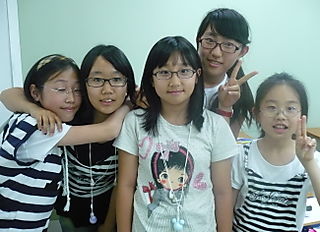 This is the ER2-Tuesday team. The most talented students, from the highest-level class. From left to right, that’s Tina, Christina, Maria, Cathy, and Stephanie. Tina is smart and a little goofy. She has a great sense of humor and is not afraid to try it out in English. Christina will someday be a famous cartoonist or manga author, and although she’s not intellectually inclined, her English is actually quite good. And she’s a great artist. Maria is brilliant and academically motivated. Not to mention brutally competitive. Cathy is one of those always-positive personalities that can make anyone around her happy, and never gives up. Little Stephanie, despite being several grades lower than the others, speaks phenomenal, idiomatic English and is quite thoughtful.
This is the ER2-Tuesday team. The most talented students, from the highest-level class. From left to right, that’s Tina, Christina, Maria, Cathy, and Stephanie. Tina is smart and a little goofy. She has a great sense of humor and is not afraid to try it out in English. Christina will someday be a famous cartoonist or manga author, and although she’s not intellectually inclined, her English is actually quite good. And she’s a great artist. Maria is brilliant and academically motivated. Not to mention brutally competitive. Cathy is one of those always-positive personalities that can make anyone around her happy, and never gives up. Little Stephanie, despite being several grades lower than the others, speaks phenomenal, idiomatic English and is quite thoughtful.
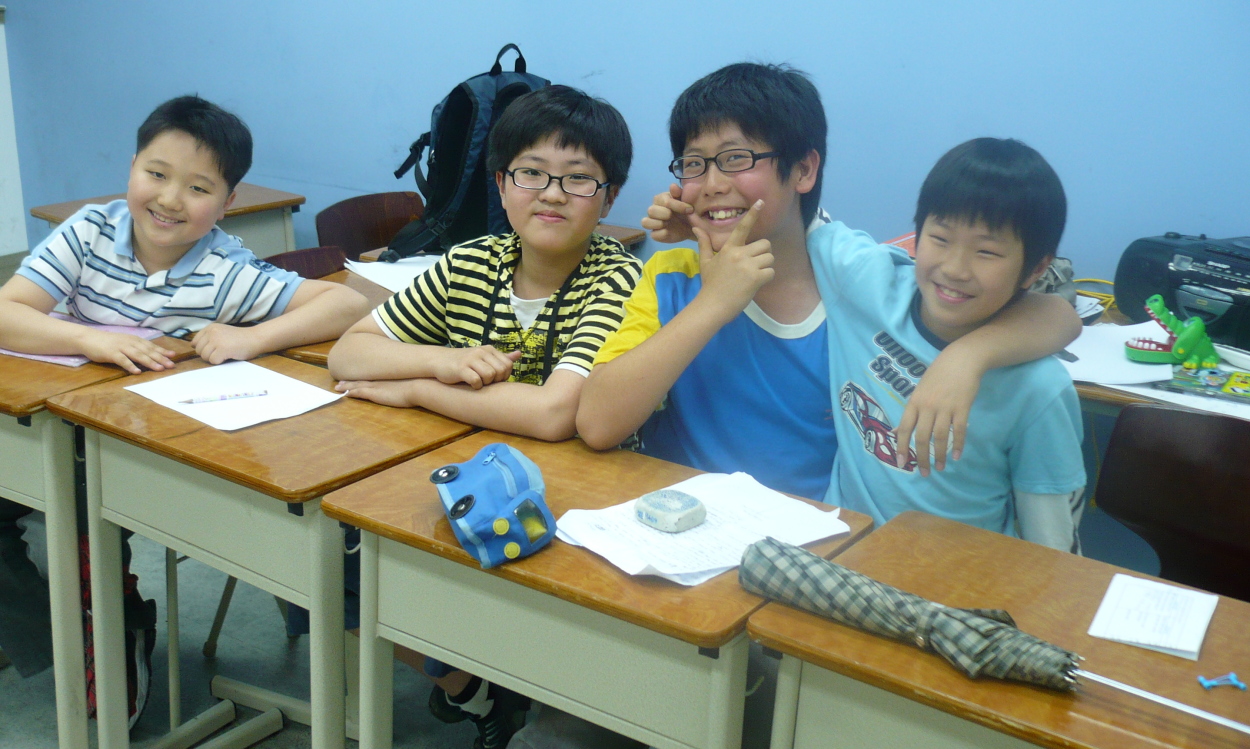 This is the ER1-Monday champion team. Actually, the reason they won was because John2 was visiting the Monday class from his home class, which was ER2-Tuesday. Otherwise the girls would have won this class championship. But they’re good guys, and I was happy to declare them the winners. From left to right, that’s Jake, John2, John1, and Joey. The ER1-Monday class has an informal tradition of making sure everyone’s English name starts with the letter J. Jake is extremely smart and very focused as a student, but needs to work on getting along better with his peers – he can seem kind of standoffish. But he reminds me of myself at a similar age. John2, as I said, was just visiting from the Tuesday “ban,” but he bonded quickly with the guys because they realized he was a huge asset to the team – he was only debater in the overall competition who actually spoke completely extemporaneously. John1 is the class goof, quite intelligent but uninterested in anything involving actual work. But he’s also almost always an asset to a class, because he’s constantly got something interesting or off-the-wall to say, to keep things entertaining. He says he wants to be either comedian or a doctor, but that he suspects being doctor involves “too much study.” Joey is moody but quite brilliant. He can often argue with his peers, but he also can surprise with his idiomatic, well-formed fragments of English.
This is the ER1-Monday champion team. Actually, the reason they won was because John2 was visiting the Monday class from his home class, which was ER2-Tuesday. Otherwise the girls would have won this class championship. But they’re good guys, and I was happy to declare them the winners. From left to right, that’s Jake, John2, John1, and Joey. The ER1-Monday class has an informal tradition of making sure everyone’s English name starts with the letter J. Jake is extremely smart and very focused as a student, but needs to work on getting along better with his peers – he can seem kind of standoffish. But he reminds me of myself at a similar age. John2, as I said, was just visiting from the Tuesday “ban,” but he bonded quickly with the guys because they realized he was a huge asset to the team – he was only debater in the overall competition who actually spoke completely extemporaneously. John1 is the class goof, quite intelligent but uninterested in anything involving actual work. But he’s also almost always an asset to a class, because he’s constantly got something interesting or off-the-wall to say, to keep things entertaining. He says he wants to be either comedian or a doctor, but that he suspects being doctor involves “too much study.” Joey is moody but quite brilliant. He can often argue with his peers, but he also can surprise with his idiomatic, well-formed fragments of English.
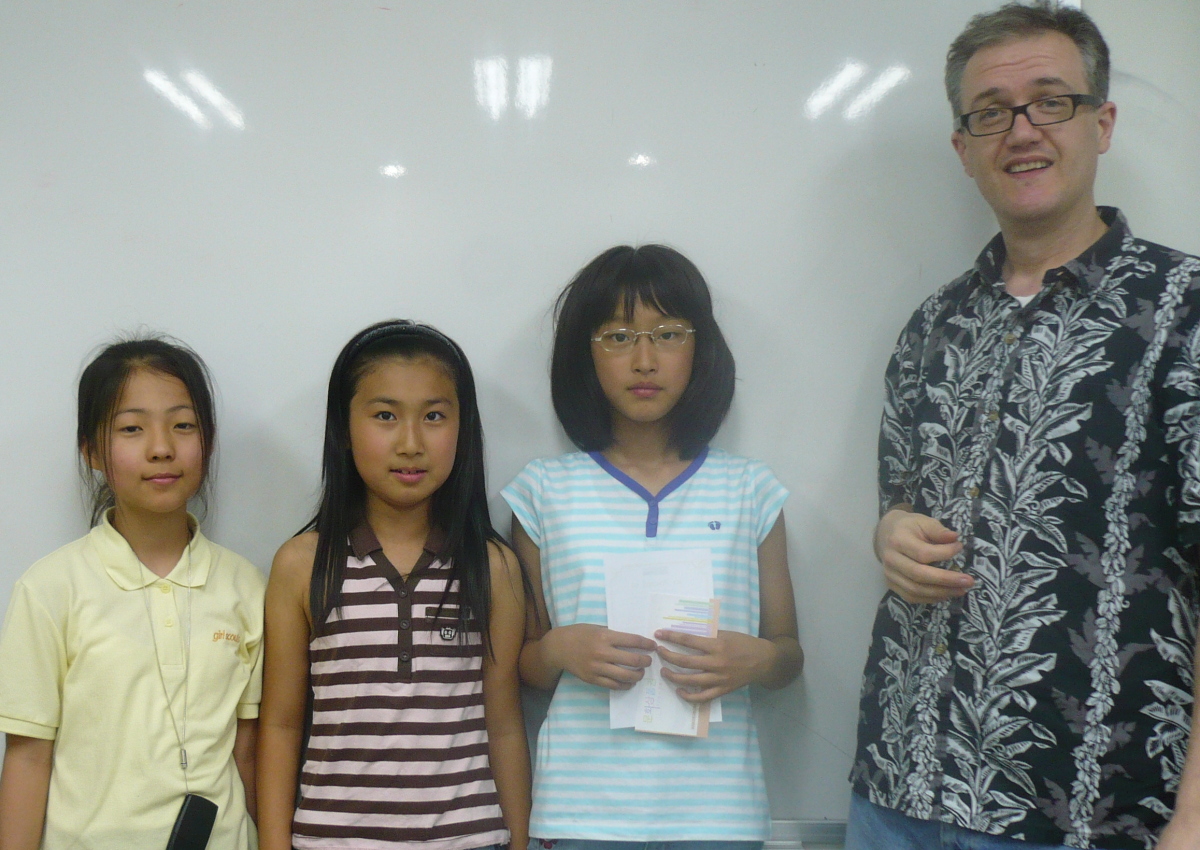 This is the ER1-Tuesday champion team. They weren’t perfect, but they were impressive partly because they managed with only three members. These girls are among my favorite students in the school They are, from left to right, Taylor, Gloria, and Ellen. And me, looking bemused and dorky, as usual. Taylor is an extroverted yet amazingly intellectual kid, with stunning enthusiasm and a true gift for not only learning but also pulling her peers along selflessly. Yet she can also demonstrate a very competitive spirit. She’s a natural leader – and if she keeps her confidence, might someday be a stunning success. She wrote all of Gloria’s speeches for the competition, and refused to take credit for them, but I saw her doing it. Gloria is a super friendly girl who often gives the impression of understanding more than she does. She just grins and nods and shrugs, and only later do I realize she was faking it. But she has managed to make friends with the two smartest girls in the class, and she leverages that friendship to her own academic benefit, I don’t think cynically, but just as if it’s part of the natural order of things. I actually think she would do just fine in an immersion environment, because although she lacks a lot of knowledge, she’s extroverted and has good non-verbal communicative competence. Lastly there’s Ellen. She initially can seem very shy, and she’s much less extroverted than the others. But she’s got a quiet confidence about her, and in any one-on-one conversation, she’s among the best in the entire school – and not just among the elementary students, but including the middle-schoolers too. It’s not so much her level of ability as the fact that she refuses to ever give up. She just circumlocutes and puzzles along until she’s made her point, whatever it is. She will never take the linguistic cop-out and leave you with “I don’t know” or “I can’t explain.”
This is the ER1-Tuesday champion team. They weren’t perfect, but they were impressive partly because they managed with only three members. These girls are among my favorite students in the school They are, from left to right, Taylor, Gloria, and Ellen. And me, looking bemused and dorky, as usual. Taylor is an extroverted yet amazingly intellectual kid, with stunning enthusiasm and a true gift for not only learning but also pulling her peers along selflessly. Yet she can also demonstrate a very competitive spirit. She’s a natural leader – and if she keeps her confidence, might someday be a stunning success. She wrote all of Gloria’s speeches for the competition, and refused to take credit for them, but I saw her doing it. Gloria is a super friendly girl who often gives the impression of understanding more than she does. She just grins and nods and shrugs, and only later do I realize she was faking it. But she has managed to make friends with the two smartest girls in the class, and she leverages that friendship to her own academic benefit, I don’t think cynically, but just as if it’s part of the natural order of things. I actually think she would do just fine in an immersion environment, because although she lacks a lot of knowledge, she’s extroverted and has good non-verbal communicative competence. Lastly there’s Ellen. She initially can seem very shy, and she’s much less extroverted than the others. But she’s got a quiet confidence about her, and in any one-on-one conversation, she’s among the best in the entire school – and not just among the elementary students, but including the middle-schoolers too. It’s not so much her level of ability as the fact that she refuses to ever give up. She just circumlocutes and puzzles along until she’s made her point, whatever it is. She will never take the linguistic cop-out and leave you with “I don’t know” or “I can’t explain.”
![]()
Caveat: Memorializing Insecurities
I just wrote this really long entry, and posted it, and it didn't show up.
In it, I talked (among other things) about my negative feelings about my teaching abilities – and then I said something to the effect of: I should stop memorializing my insecurities online, as it does me no good to dwell so much on the negative. So I think there's something karmic (or at the least apophenic) in the fact that the post failed to stick.
I was watching an episode of That '70's Show, recently, and the character Hyde says, "Oh my god, I've been using sobriety as a crutch!" I found this extremely funny and philosophically fascinating, too. It seems there's a human impulse to obsess negatively on almost anything: drugs or other classic addicitons, for sure, but also religion, politics, or even sobriety.
Caveat: Sith Master of Silicon Valley
I was reading a Forbes magazine article (byline Brian Caulfield and Wendy Tanaka 06.13.08) about the failure of the Microsoft-Yahoo deal and Yahoo's subsequent scramble for googlence, and one of the lines that stood out to me was a characterization of Larry Ellison (the wildly eccentric boss of Oracle Corp) as the "Sith Master of Silicon Valley." I liked the idea that this might be on target.
I'm a shareholder in Oracle, and furthermore, I hold an Oracle certification as a Database Administrator – which is ironic since all my actual DBA and development work has been with Microsoft's competing SQL Server product, for which I hold no certification.
Despite this, I am not a fan of their product line, exactly – it is about as baroque as a high technology product line can get and still function. The reason I bought stock in the company was, rather, because I saw first hand, during my years working with the Paradise Corp (a pseudonym) IT department the amazing ease with which Oracle's enterprise sales team took my employers for a multimillion dollar ride. A project which was started in 2003 is still going on, years after the original anticipated "go live" date, and as far as I know, it barely works if at all, and only with a zillion caveats (appropriate to mention, I suppose, for this blog).
I figured if all of Oracle's sales teams were half as effective as the ones working my IT higher ups at Paradise, that company had a locked down revenue stream for decades to come. So, through thick and thin, I remain a loyal Oracle shareholder – and among all my long-term holdings, it's been, overall, one of the most pleasing. Or maybe that's just the luck of jumping on (and off and on again) the bandwagon at the right time?
Caveat: My Life as a Multimillionaire
Sometimes I can't get over being a multimillionaire. In Korean currency, that is: there are about 1000 KRW to each dollar – so my Korean bank account has millions at the moment. It seems like so much, with all those zeros!
But actually, I'm living quite modestly, of course. And the stock market hasn't been my friend, either. Since my last comment on investments, some months back, things have been pretty level for me, but there's been no leap forward either. Ah well – it's all a bit like gambling, I suppose.
The point is (as I explained to my accountant): I'm kind of living a "vow of poverty" in a weird, nonreligious way. A secular monk. And I'm cool with that – I find money issues generally annoying if not downright depressing.
I did finally buy a new MP3 player yesterday. I got a tiny 2GB Samsung product called "Yepp." I knew I wanted to go "generic" – to avoid the greater and lesser Satans. Microsoft is the greater Satan, of course - and this requires no explanation. But many people don't understand why I consider Apple (and iStuff) to be the lesser Satan. I guess it's a matter of content over hype – I still harbor this old feeling of betrayal when the transparent, essentially "open source" hardware known as Apple II was replaced by the hyped-black-box concept called Mac. Apple II was my first computer. And I learned 6502 Assembly language on it, and how to hack Apple's DOS. It was a great learning experience and converted me, for ever and ever, to the open-box philosophy, vis-a-vis computers, anyway.
The weather has been steamy and summery lately, but today the humidity is lower and it's quite pleasant. I'm going to work at having a positive attitude, a la "The Secret" – so hyped by Oprah and on the internet.
Caveat: The Beef
There have been massive and ongoing protests here in Korea over the government's efforts to comply with what should have been a rather routine resumption of imports of U.S. beef. Most international analyses of this situation that I have seen focus on the fact that it is about more than beef, but that it's not necessarily simple anti-Americanism either. Something in-between: it's about authority and control – meaning, whether or not South Korea can or should yield to American pressure to resume imports, or whether it should stand on its own authority and resist.
I find this intriguing, given my own neverending saga over the question of authority and how to deploy it successfully in my current work environment. This evening, I became frustrated because I felt that one of my coworkers had undercut my authority by telling me, in front of a student, that maybe I shouldn't make them stay late to finish homework (a fairly common form of mild discipline for students who don't complete their work). This set me up, since to make the student stay at that point I was not only being "unfair" to the student but also ignoring the plea for compassion from one of the student's other teachers.
When I complained about this, the response was: oh, we're not undercutting your authority. And a demand for concrete examples of other times I felt this occurred, since I had worded my complaint rather broadly, and said that I felt my authority was "frequently undercut." This wasn't wise of me, as arguments with my one supervisor always seem to devolve into arguments of the factuality of my complaints – a good strategy on his part, since the burden of proof is on the complainer.
Regardless of the wisdom my complaint, I found myself feeling especially put off by a suggestion that somehow the only reason I lacked authority with my students is because I somehow don't have the creativity or force of personality to make that authority for myself. And coming home and looking at the news, I started to think about the radically different relationships American and Korean cultures cultivate with respect to the concept and practice of authority. All of which is to say, I'm aware that there's a cultural gap underlying the communication gap, which is brought to the fore by the "authority" gap that I'm experiencing everyday. And I have no idea how to proceed.
Caveat: Englyns
I’ve been experimenting with writing englyns – these are complex, rigid Welsh poetic forms – not in Welsh, though. This is a small englyn penfyr I made:
nobody sees sky’s glimmer, the sun falls,
-nobody feels the summer-
nobody sees air’s shimmer.
Sometime back I tried writing one in Spanish, too – probably not as good. And this one is about being angry:
a veces siento enojo de perro,
ira de piedra, un rojo
enfado de hombre cojo
Traditional Welsh poetry is fascinating to me because of its demands for such highly structured forms – almost like Japanese haiku, for example. And, as Georges Perec once pointed out (and probably others), it is constraint that leads to truly innovative artistic expression, and not freedom.
I remember as one of my most productive periods of poetry-writing the time when I was experimenting with highly constrained forms such as the alexandrine sestina, with additional non-traditional constraints on such things as “characters per line” (thus I could produce completely justified poetic lines using monospace type with no additional spaces).
[UPDATE: the first englyn above was included in my daily poem series and republished on this blog on June 9th, 2021, as poem #1774.]
Caveat: Charisma, Authenticity, Control
Last night, one of my advanced students stunned me with one of those overly frank and penetrating observations that seem far-too-frequent lately: they said that I lacked "charisma." For a moment, I almost thought I had misunderstood. But it was too close to the mark (vis-a-vis my insecurities about my qualities as a teacher) to be a simple misunderstanding.
Another person recently remarked that my blog wasn't the "real" Jared. In essence, that it lacked authenticity, I guess. And again, guilty as charged.
Last week, the thing that had me so frustrated was a remark by my boss Curt, when he said to me something to the effect that "If you can't control your class, you must not be a very good teacher." And, by Korean cultural standards, there are definitely classes where I'm certain I'm perceived as not being in control. Of course, he also said that if I couldn't make the clearly inadequate curriculum work in my classroom, then I wasn't trying hard enough.
I'm not even going to try to reason through the connections between these three observations. I don't know that any of them are inaccurate. I also can say, from the "inside," that they aren't the whole story, but that doesn't leave me feeling any less discouraged.
Lastly, it was announced yesterday that RingGuAPoReomEoHagWon (my employers) was going to be folded into another language academy venture just acquired by the parent holding company. And this other language academy has a stunningly bad reputation vis-a-vis quality and management, from the little I've heard or observed. Nothing stays the same for long. But given how I'm currently feeling, I can almost guarantee that when the moment comes to re-negotiate my contract, I'll opt out.
Life will go on. What's next?
Caveat: Monks About
I recently came to the realization there must be a Buddhist temple in my building. Sometimes I hear chanting-like noises, and at first I thought it was a neighbor’s television – but it really didn’t sound like a normal television program. And then I saw a sign near the back entrance to my building, and that sort of confirmed it – the swastika is the standard Korean symbol for “Buddhist establishment” used on signages and maps. Here is a picture of the back entrance to my building.

![]()
Caveat: Humilific Fun
“Humilific” is a real word – it describes a class of Korean words (mostly verb infixes and pronouns) that are used to show deference on the part of a speaker with respect to a listener. They are somewhat the inversion of an honorific, which are linguistically more common, and which exalt the listener’s position with respect to the speaker. A good example of a beginner’s level humilific is the use of 저(jeo) instead of 나(na) to mean “I” (first person singular). When I call a student’s house, and I get a parent who I can’t expect to speak English, I have a phrase of badly pronounced Korean where I say “I am the English teacher” and I use this humilific form for the “I” in this sentence: “저는…” (jeo-neun …).
Here is a picture of a building I saw in Suwon, on top of the hill I climbed there last month when I went there, just for kicks and to provide something interesting to look at.
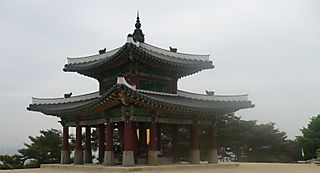
And for those who feel that the price of gas in the U.S. is out of control, consider this:
 That’s 1913 Korean won per liter, which comes out to about $7.25 a gallon at recent exchange rates. The fact is, American gasoline is highly subsidized, if only indirectly – not least by that astronomical Iraq war cost, but also by military aid to e.g. Saudi Arabia.
That’s 1913 Korean won per liter, which comes out to about $7.25 a gallon at recent exchange rates. The fact is, American gasoline is highly subsidized, if only indirectly – not least by that astronomical Iraq war cost, but also by military aid to e.g. Saudi Arabia.
![]()
Caveat: Californio
A speech by Pío de Jesús Pico, a mestizo businessman of Los Angeles who was the last governor of California when it was still part of Mexico:
What are we to do then? Shall we remain supine, while these daring strangers are overrunning our fertile plains, and gradually outnumbering and displacing us? Shall these incursions go on unchecked, until we shall become strangers in our own land?
So he was what has been called a Californio – a pre-U.S.-annexation Californian of Spanish or mixed Native American and Spanish descent. Pico actually had an African great grandmother, too, from what I understand. I've always found the history of the Californios fascinating – it's a kind of forgotten group.
He took refuge in Baja California during the war, but afterward he returned to Los Angeles and made peace with the gringafication of the region, even running for city council at one point, and building a famous hotel. But he died a pauper because of his extravagant lifestyle and gambling habits.
Caveat: The Right Thing
Clinton concedes, at last. Which is the right thing, I think. So now it's Obama vs McCain.
I'm very tired. I had an exhausting and demoralizing week. I'l ltry to explain later.
Caveat: Holy Cow… uh, Brains.
One change I'm beginning to notice since the election of the conservative and pro-American Lee Myung-Bak as president last December: many who oppose the new president, one whatever grounds, incorporate a certain strident anti-Americanism into their discourse. This is logical, as South Korea's relationship with the U.S. is (and has, historically, long been) an emotionally-loaded hot-button on both the left and right.
This is nowhere more visible than the current outcry over something that was supposed to be a routine aspect of moving forward on a free trade agreement with the U.S. that was part of the president's platform: the resumption of imports of American beef. South Korea, like Japan, had placed a ban on American beef imports back in 2003 after the incident where an American cow had been detected with BSE (bovine spongiform encephalopathy), more commonly called mad-cow disease.
Now that the government has moved to remove the import ban, many Koreans are in a panic over the possibility of infected U.S. beef unrestrictedly entering their markets and diets. It hasn't helped that there have recently been other issues with the U.S. beef supply (not directly related to mad-cow but definitely related to broader food-safety concerns), such as the authorities closing down that giant processor in California a few months back when it was discovered the place was allowing clearly sick cattle to proceed to slaughter, in contravention of law.
I'm of two minds regarding the Korean public's hue and cry over mad-cow. On the one hand, I regret that political opposition to the president and his policies, often quite legitimate, is being anchored to an issue with such flimsy scientific foundations as BSE, which is not clearly understood by any scientific community in the world, and given that no incontrovertible case of transmission of "mad-cow" from meat to human has ever been documented in the U.S. (although 3 cases of "new variant Creutzfeldt-Jakob Disease" have been found via autopsy – but that's out of a population of 300 million, and it's never been shown that BSE is the only possible source of vCJD).
Nevertheless, I do believe strongly that there are other very strong health and environmental reasons for attempting to reduce consumption and better regulate the world's beef supply – and U.S. beef industry practices are central to this. Factory farming of beef is neither environmentally sound, nor is it sustainable, and, likely, it will eventually be linked to all kinds of currently poorly-documented and little-understood health ills.
For these reasons, I tend to support the South Koreans' protests as being "right action for wrong reasons." Which is pretty common in politics, in general, in my opinion. Burning effigies of American cows – have at it!
Caveat: The Supremacy Clause and Judicial Activism
Ever since the U.S. Supreme Court's decision in Medellin v. Texas (earlier this year), I have felt deeply troubled. The so-called "supremacy clause" of the U.S. Constitution states: "all Treaties made under the authority of the United States, shall be the supreme Law of the land." But the court held that unless the Congress passes specific laws implementing treaties, treaties are not binding domestic laws. How is this interpretation in any way in line with constitutional intent?
I'm not trained in law, but the supremacy clause, and our governments' disregard for it, has always troubled me. I feel strongly that the "founding fathers'" intent was in line with something U.S Grant subsequently envisioned:
I believe at some future day, the nations of the earth will agree on some sort of congress which will take cognizance of international questions of difficulty and whose decisions will be as binding as the decisions of the Supreme Court are upon us.
Essentially, I think that the Supremacy Clause must have specifically had in mind the sorts of binding supranational treaties we now see with organizations of states such as the U.N. or the E.U. I don't think that such supranational polities were in any way beyond the conception of the founders of the U.S., given that it seems very likely they viewed their own project as a supranational rather than national project – there was nothing subtle or requiring interpretation in the name they chose: United States of America. They expected more states to join, they thought they were already supranational, and they were not trying to build a nation, but rather replace it, as a concept, with something new. In this sense, the E.U. as it stands today is perhaps closer to their conception than the contemporary U.S.
That's just my opinion. So… whatever. I had a bad day today at work, so I decided to rant on about something where I'm both uninformed and singularly unempowered.
Caveat: Eliminating the Middlemen in Government
We could just put the corporations in office, directly. I read a sci-fi novel years ago that had such a scenario, where instead of electing an individual to the presidency, Americans voted in a corporation for a fixed term of office – essentially granting that business a contract to "run the country." I wish I could remember the title or author. The concept is too "loaded" (in a satirical sense?) to be effectively searched out in googleland – which is to say, every effort to describe the concept for the search engine only leads to infinities contemporary political and satirical commentary.
I was reminded of this by a clever and silly Onion video I found last night.
Caveat: Apophenism
Wikipedia says: "Apophenia is the experience of seeing patterns or connections in random or meaningless data." I think this is one of the most salient features of human psychology, and a defining characteristic of postmodernity as well. Or perhaps I'm just seeing patterns in random data?
One of the most amazing novels, Pornographia, by Witold Gombrowicz (a Polish-Argentine writer), deals with this phenomenon. The somewhat embarrassing-to-cite title is in fact misleading – and part of the apophenic game that goes on throughout the whole novel, as it leads the reader into making all kinds of efforts to see meaning where none is to be found. The title's relation to the novel is in fact the first apophenic movement of the novel, which continues in the same mode throughout.
Actually, the thing that made me think of apophenia might seem surprising. I was thinking about macroeconomics, the relationship between command economies and truly market-based ones, and all those gray areas in between. This was prompted by a recent short article in The Economist (May 31st, 2008) that was explaining the recent government-mandated "restructuring" of the massive and fast-growing Chinese telecoms industry. To quote the line from the article that got me thinking: "Each time the government has arranged things to mirror the outcome produced by market forces in the West."
First, I thought, "how clever." They get the best of both worlds (from their point of view): command economy as well as the presumed efficiencies of market capitalism. It's like if the proposed God of the ID (intelligent design) people had a little (or not-so-little) Darwinist laboratory running somewhere "on the side" where He (yes, He – we're talking IDers, right?) that can give Him ideas, and then He imitates it and makes it even "better."
But then I started thinking. First – just how random and/or market-driven is what happens to e.g. telecoms markets in the West? And second, is it really proven that the patterns that emerge in terms of how markets are structured represent some kind of best-rises-to-the-top principle? We presume that market economics is Darwinist and necessarily leads to efficiencies, but why would it? Maybe the patterns we see in truly unconstrained markets (to the extent they are, in fact, unconstrained) are just manifestations of apophenia?
I think I want to add the title of "Apophenist" to some of my others. It's a neologism, although google makes clear it won't be mine, as it's already out there.
Caveat: 도스타코스 (K-Mex?)
I went into Seoul and shopped at my favorite bookstore – Kyobo, just north of Gangnam station (on the Green Line) in the massive Kyobo Tower, along Seochoro. I bought some manga books, a Korean language grammar, and a novela by García Márquez entitled La hojarasca – yes they have Spanish language books at Kyobo, although the selection is only about a single shelf’s worth.
So… I was walking southward back toward the subway station, feeling pleased with my purchases, and lo! there was a taco and burrito joint. Really. In Seoul. I took a picture of the sign:

The place is called “Dos Tacos” (in Hangeul, 도스타코스 = doseutakoseu). I went in and had a delicious veggie burrito. It’s definitely Americanized-style Mexican food, passed through a slight but perceptible Korean filter, but it was a nice change. I wonder if there’s a future in K-Mex cuisine?
I’ve noticed that my blog host seems to be inserting my picture uploads differently than before – it appears to be placing them inline rather than making thumbnails and linking them out. I wonder if I like this better. I’ll have to think about it, and try some things out.
Earlier, I had been wandering, a bit randomly as is my occasional wont, and I saw some flowers growing through a fence near a railroad right-of-way, also in the Gangnam area. Here is a picture:

![]()
Caveat: Faith Based Disaster Management
It seems that in the recent presidential campaigning in the US, both McCain and Obama tend to have problems with endorsing and supporting pastors, priests and various other reverends making outlandish, intolerant and otherwise inappropriate remarks. This has led to both campaign staffs developing extensive "Faith Based Disaster Management" skills, as one recent blog described it.
I like the term. Not sure where I'm going with the concept, though.
Caveat: Densities
I just read an article that included the information that Los Angeles is now the most densely populated metropolitan area in the U.S. This is so contrary to perception and conventional wisdom – to imagine that it is more densely populated than especially crowded-seeming east-coast cities like New York or Boston. And I wonder especially at the criteria – there is a lot of "in between" space in Los Angeles – the Santa Monica mountains, or the little ranges of mountains between the airport and downtown, or the Arroyo up toward Pasadena. How do these open spaces count in the calculation of densities? Alternately, how do the open water spaces of a water-oriented city like New York get counted? And what about "freeway space" – which abounds in LA and virtually doesn't exist in NYC – is it excluded in the calculations, too? I just can't see that, on a comparison of built-up areas to built-up areas, that LA is higher density, given how high-rises so dominate places like Manhattan or the projects of the Bronx.
Then again, Mexico City manages to be one of the densest metropolises in the world with very few (relatively speaking) high rises. I'm just not sure about all this. Regardless, we also need to understand that higher population density doesn't necessarily imply lesser transportation dependence. NYC may "seem" denser because of the very high level of public transportation usage in the city, compared to a place like LA.
Caveat: 뭥미?
A new bit of Korean youth slang: "뭥미?" (mweong-mi? said in a kind of dumb rising tone). It means something like "what the?" (as in "what the hell?") although you won't find it in a dictionary. When I say it in the right situation to one of my classes, everyone collapses in riotous laughter. But when I tried it out on Curt (my boss), he said "is that Korean?" Generation gap, y'know?
Caveat: Dodging Popperazzi
I finished Lee Smolin's book, The Trouble With Physics. I've been looking at some critical reviews, online, too. Several people mention Susskind's use of a term "popperazzi" to refer to people who make a big deal of Karl Popper's ideas about the importance of "falsifiability" in developing scientific theories, and I think that it is probably accurate to say that Smolin's book is, at least in part, a popperian review of contemporary physics, especially string theory.
I'm not a physicist, nor a mathematician. And I don't really have an opinion about string theory, either way, although I never found it as intuitively appealing as, say, general relativity or even quantum mechanics, to the extent that I understand them at all. In that vein, I'll confess I find Smolin's earlier-enunciated, and currently somewhat academically marginalized, loop quantum gravity theory more intuitively appealing.
But I also would agree with Smolin's critics that his popperian view of string theory is overly combative and ends up coming across as academic sour grapes. It's too polemical to be useful. And I do think that Popper, to the extent I understand him, may not have been the last word on how science works.
Caveat: Missing the Train to Trenton and Other Misfortunes
I woke up from a series of stunningly unpleasant nightmares this morning. I don't often have nightmares, actually. Not sure what it's about.
First, I dreamed I was waiting for a train to Trenton. I'm not sure why I needed to go to Trenton, although it's not purely random: there was that year I lived with Michelle in Yardley, across the river from Trenton, and it was a year full of frustrations, as it was the summer I took my master's exams, which, despite my passing, were not what I had hoped for. I couldn't figure out where I was, exactly, either. The place I was in could have easily been somewhere in Korea.
Anyway, I was not near the platform and the train was pulling in. I ran to catch the train, but I realized I had dropped an important list. The list was written on a long piece of tissue, like from a roll of toilet paper. Wind blew it under the train, and I couldn't bring myself to board the train without the list. The train pulled away, and waiting on the other side of the tracks was a woman in a grey Oldsmobile – like Michelle's old, generic-looking (85?) Oldsmobile. The woman scolded me for missing the train. I realized the list was still blowing away in the wind, and I had no chance of catching it.
Then I was having a different dream. Things were not clear at all – more a gestalt of images than any kind of comprehensible plot line. I was in the mountains of Guatemala, trying to drive one of those recycled 60's-era school-buses they use for public transit there. True to form, there was a Virgin Mary on the dashboard and blinking Christmas lights around the front windows. But my passengers were a group of my students from the hagwon, and one of them was on some kind of Quest. You know, the sort of thing that involves dragons and swords of power or stuff like that.
But we'd managed to misplace some of the other students, and we were looking for them. And there was something in flames, and the road was bad and had donkeys in it, and women with bundles of coffee or something stumbled around in the periphery. And then I lost control of the bus and jumped away, only to watch it carom to the bottom of a hillside and knock over a tree. And my students were all standing around me, crying.
And then I was having a different dream. I was trying to find someone's house, driving my old 1965 VW Bug around something that was like a cross between Los Angeles and Seoul. And I came to this really bad neighborhood. Maybe more like Mexico City at this point. And I drove down this dead-end street that was very steep, downhill. And I parked my Bug at the bottom, and got out to knock on the door of this house, but it was the wrong place. And then I went to get into my Bug, but I remembered that the starter was broken (Which was common with that car), and that I would have to roll-start it. But the problem was that I'd parked almost at the bottom of the hill, and it was a dead-end.
I decided to try to kind of roll it crossways at the end of the street, but as I started pushing it, it dawned on me that there was no barrier at the end of the street, just this gaping deep chasm. And suddenly I realized I was going to roll my car right into the chasm. And the brake wasn't working. And stupidly, rather than just jump away, I thought of trying to get in front of the car to stop it. And so the car pushed me right off the cliff, and I fell into the chasm with my car above and behind me, and I crashed at the bottom and was crushed by my VW, and I woke up breathing very fast and scared.
Caveat: The Franchise
I am enfranchised. Meaning, I can vote as a U.S. citizen, despite being, currently, a resident of South Korea. But here's something interesting: if I were living in Puerto Rico, instead of South Korea, I would lose my franchise – despite the fact that Puerto Rico is part of the U.S., while South Korea clearly isn't. Why in the world is this the case?
I mean… I know why it's the case – it's because of Puerto Rico's "special relationship" with the U.S. (i.e. the fact that basically it's a colony). But all the same, there's more than a little bit of irony in the fact that by adding Puerto Rican residency to an otherwise enfranchised U.S. citizen causes that citizen to forfeit his or her franchise. It's like the federal government grants the status of convicted felons, gratis, to the whole island. Weird.
Caveat: The Ironies of Theoretical Physics
I'm reading a book by Lee Smolin, entitled The Trouble with Physics. It's an interesting book – one of those layman's accounts of all kinds of weird and interesting things about what's going these days in the world of theoretical physics. A "popularization" I guess it's called. Partially, it's a rant (though a largely courteous one) against the domination of string theorists in the current world of physics academia.
Anyway, I re-learned something I remember learning before, and for some reason it struck me as incredibly funny. The graviton (an as yet not-well-documented fundamental particle which is the "carrier" particle of gravitational force, much as a photon is a "carrier" for electromagnetism) is a necessarily massless particle. That's right – the graviton is massless. Isn't that… funny?
Caveat: 헐!
I’m not sure exactly what it means, but I feel that I’ve come to understand its linguistic pragmatics quite well. The word is “헐” (roughly pronounced as a long, drawn out “hol”). I may be wrong, but I think that its literal meaning may be close to “broken” or “busted.” But in terms of pragmatics, it seems to be used very similarly to the way youth culture in the U.S. uses the word “dude!” as a kind of general purpose exclamation of surprise, interest or dismay. I’m trying to pronounce it authentically and use it appropriately, and a few times my students have been quite amazed and pleased at my having used it. 헐!
Today was a day of contrasts.
I had one extremely terrible, horrible class – a group of lower-level elementary students who just wouldn’t behave. I finally had a loud, verbal tantrum and set them to copying sentences, I was sooo frustrated. I almost never resort to these sorts of make-work “punishments” that are next best thing beating the kids with a stick (which is completely out of the question as far as I’m concerned, regardless of what my colleagues may do).
But I also had a fabulous class for the debate topic, with the lowest level middle-schoolers. The debate question was “Are pets a good idea?” – fairly elementary question, but about right for their level. And they all wanted to say “No, they’re not.” So we improvised, and they had to debate against me – I would make a little speech, then one of them, then I would, then another, then I would, and another. And I selected two of the students to be “judges” and placed a handicap on myself, since I allowed the judges to only score me up to 5 points, whereas they could score their peers up to 10 points. It went very well, and the students won. It was pretty cool, and I could tell they were having fun and actually learning something.
Then I had an interesting occurrence in my TP cohort, where I’ve been forced to give up the “debate program” in favor of a very dry, boring text that’s intended to prep them for the iBTOEFL (internet-based TOEFL) speaking section. They were moaning and complaining about the boringness of the book, and I was trying rather lamely to defend it (and failing, as I really at heart agreed with them). And then, after the class was over, they were standing around in the lobby area on between-class break and the six girls lined up in a row in front of the counter, and Pete was standing behind it, and I heard my name (Je-re-deu-seon-saeng-nim) and something about textbooks in Korean, and, lo and behold, they were holding a rebellion: they were collectively requesting to Pete that their class with me be returned to the debate curriculum. I couldn’t help grinning and I’m certain Pete saw my expression, and so I ran away and decided to let their complaints have their effect. And maybe, just maybe… I’ll get to go back to teaching something that I want to be teaching them. I’m excited.
![]()
Caveat: And So On
I recently found out that the new president of Russia, Dmitry Medvedev, is exactly one day older than I am. This is very weird – the idea that someone my age is the president of something like Russia. I suppose Obama is only a few years older, too, should he win the presidency in the US. That's an odd thing, when world leaders start being people who are one's contemporaries.
Quote.
"A story should have a beginning, a middle, and an end… but not necessarily in that order." – Jean-Luc Godard
Caveat: Orange Moon Over Ilsan
I was walking home and saw a very vivid orange moon. I took this picture but it didn’t come out very well. The moon was very bright and very orange.

I had a class today where none of them did the homework. This is normally a very devastating and difficult issue… but somehow, their refusal to work is of a different quality from previous experiences of this problem, as I actually enjoy these kids in class a lot, they can be funny, and are often engaged and interested during class. They’re just unmotivated with respect to homework, I guess.
So, today, I got a clue that there might be some “reverse-status” peer pressure, too – i.e. pressure to do badly. This is common with teenagers in the States, but not something I’ve seen much of here. The reason I think this may be occurring with this group is because it turned out, well into the class, that one of the students had, in fact, done her homework, but had apparently been embarrassed to show it to me. I saw she was copying an in-class exercise from a paper that suspiciously looked like the homework, and I got down in front of her and pulled the paper out, and she actually pulled back, before letting me see it. Lo and behold, it was the homework, and it was actually very well done! So all of her peers had zeros, and I gave Eunjeong a 100%. And she seemed sincerely unhappy with this. Very… odd. Kinda sad.
Here is a picture of an oldish building (or rather, design-to-look-oldish) I saw in Seoul recently, coming down a steep hill on side street, south of the river.
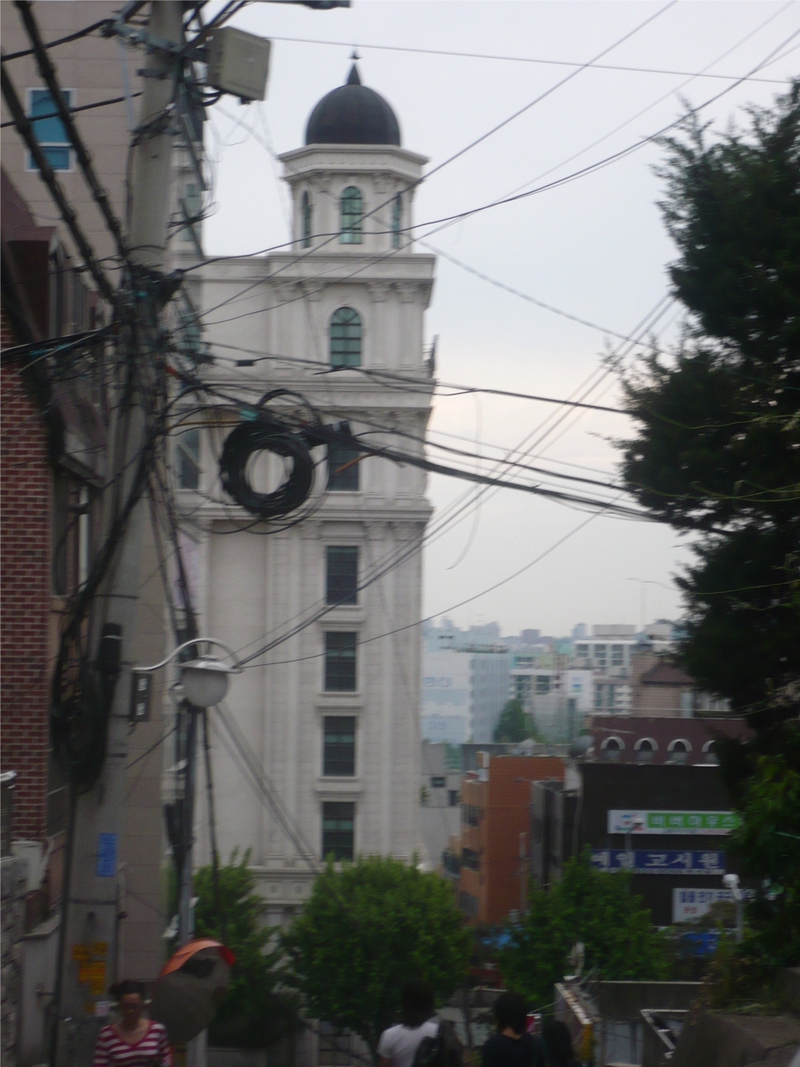
![]()

